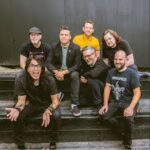Mustard Plug, a ska punk band hailing from Grand Rapids, Michigan, emerged in the early 1990s as one of the pioneering forces in the American ska revival scene. With their infectious blend of ska, punk, and reggae, Mustard Plug captivated audiences with their high-energy performances, catchy melodies, and socially conscious lyrics.
The story of Mustard Plug begins in 1991 when a group of friends and musicians from Grand Rapids, Michigan, came together with a shared love for ska music and a desire to start a band. The founding members included Dave Kirchgessner (vocals), Colin Clive (guitar), Craig DeYoung (bass), Anthony Vilchez (drums), and Mike McKendrick (trumpet). Drawing inspiration from the vibrant ska scenes of California and England, they set out to create their own brand of ska punk that would resonate with audiences far and wide.
The band’s name, Mustard Plug, was inspired by a slang term used by their friend Mike Broers, who jokingly referred to a mustard container as a “mustard plug.” The name stuck, reflecting the band’s irreverent sense of humor and DIY ethos. Mustard Plug wasted no time making a name for themselves in the local music scene. With their energetic live performances and infectious ska rhythms, they quickly gained a loyal following in their hometown of Grand Rapids and throughout the Midwest. Their debut album, “Skapocalypse Now!” released in 1992, showcased their signature sound and garnered rave reviews from fans and critics alike. However, it was their sophomore album, “Evildoers Beware!” released in 1997, that catapulted Mustard Plug to national prominence. Featuring fan-favorite tracks like “Beer (Song)” and “Mr. Smiley,” the album showcased the band’s musical prowess and social consciousness, tackling issues such as alcoholism, consumerism, and political corruption with wit and humor. Buoyed by the success of “Evildoers Beware!,” Mustard Plug embarked on extensive tours across the United States and Canada, sharing the stage with renowned ska and punk acts such as The Mighty Mighty Bosstones, Less Than Jake, and Rancid. Their electrifying live shows, marked by frenetic skanking and sing-along choruses, endeared them to audiences of all ages and backgrounds, cementing their reputation as one of the premier live bands in the ska punk genre. In addition to their own headlining tours, Mustard Plug also collaborated with other artists and bands, further expanding their reach and influence. They contributed tracks to numerous ska compilations and split albums, sharing the spotlight with fellow ska bands and helping to introduce ska music to new audiences. As the years passed, Mustard Plug continued to evolve and experiment with their sound, incorporating elements of punk, reggae, and even metal into their music. Their third album, “Pray for Mojo,” released in 1999, showcased a more polished and mature sound, with intricate horn arrangements and complex song structures. Tracks like “The Freshman” and “Throw a Bomb” demonstrated the band’s growth as songwriters and musicians, earning praise from fans and critics alike. Subsequent albums, including “Yellow #5” (2002) and “In Black and White” (2007), further solidified Mustard Plug’s reputation as innovators in the ska punk genre. From the infectious ska-pop of “You” to the anthemic punk rock of “Hit Me! Hit Me!,” each album showcased the band’s musical versatility and penchant for catchy hooks and memorable melodies. In addition to their musical endeavors, Mustard Plug has been vocal about social and political issues, using their platform to raise awareness and inspire change. Over the years, they have supported various charitable causes and organizations, including environmental conservation, LGBTQ+ rights, and anti-racism initiatives. Moreover, Mustard Plug’s lyrics often tackle themes of social justice, inequality, and resistance, reflecting the band’s commitment to speaking truth to power and challenging the status quo. Whether addressing the perils of unchecked capitalism in “Everything Girl” or condemning police brutality in “The National Threat,” their music serves as a rallying cry for solidarity and activism. Today, Mustard Plug stands as one of the most beloved and enduring bands in the ska punk genre. With over three decades of music-making under their belts, they have inspired countless fans and influenced scores of aspiring musicians with their infectious energy, DIY ethos, and unwavering commitment to their craft. Moreover, Mustard Plug’s legacy extends beyond their music, encompassing their role as ambassadors for ska punk culture and advocates for social change. Through their music, activism, and community engagement, they have left an indelible mark on the world of music and beyond, inspiring future generations to skank, resist, and create.Mustard Plug’s journey from a group of friends jamming in a garage to international ska icons is a testament to the power of passion, perseverance, and solidarity. As they continue to delight audiences with their infectious ska rhythms and socially conscious lyrics, Mustard Plug remains a shining example of the transformative power of music and the enduring spirit of the ska punk movement.










